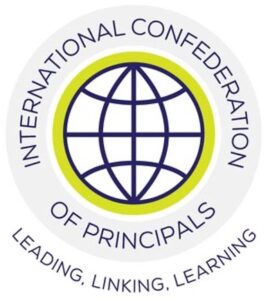

On 22 and 23 September, EFEE was delighted to participate in the Council+ Meeting organised by the International Confederation of Principals in Rovaniemi (Finland). The meeting built upon the success of a previous gathering in Singapore, in 2021, and aimed at fostering international collaboration and exchanging knowledge. This year’s AI-powered conference concentrated on benefits and threats of Artificial Intelligence in school education, indigenous people education worldwide and leadership.
The first day began with the session on challenges of sustainable leadership. While AI can positively contribute to school education with its efficiency, accessibility, and data-driven insights, it also brings along concerns about privacy, bias and fairness or teacher’s displacement. Afterward, the audience was introduced to the Finnish education system, including the role of governance, parental councils, and principal barometer results. Thanks to the national guidelines set by the Ministry of Education and Culture, municipalities have autonomy in designing and implementing education policies which allow customisation. Parents’ contribution to school decision-making, as well as building trust and partnership between schools and parents, significantly impact the quality of education in Finland. Finally, the principal barometer results are being continuously improved with the support of various stakeholders.
Third session brought perspectives directly shared by students who joined from across the globe (Argentina, Canada, New Zealand, Singapore, and Finland). The conclusions were clear: there are multiple reasons why the students’ voice needs to be considered. Firstly, listening to students empowers them to take ownership of their education. Secondly, personalised learning and critical thinking foster better outcomes. Lastly, it creates a safe and inclusive environment, as well as strengthens school-community relations. Student voice forums can be developed through students’ councils, regular training and support, and feedback mechanisms. Last session of the day was about education of indigenous people in Finland. The Sami are indigenous people inhabiting northern regions of several countries, including Finland. Sami language is officially recognised alongside Finnish and Swedish and there are possibilities to learn in Sami language on the level of pre-school, basic, and upper secondary education. Some obstacles that still need to be overcome are language shift, lack of access to higher education in Sami and cultural preservation.
The second day of the Council Meeting began with the responses about indigenous education from New Zealand, Africa, and Canada. It is important to mention that Rights of the Indigenous People were mentioned in the UN declaration, which emphasises the significance of safeguarding the rights to indigenous communities globally. Efforts to address discrimination, increase indigenous learner representation, and support indigenous teachers were also discussed. Insights from different continents were presented, e.g., Canada, in particular Ontario, faces challenges with limited availability of indigenous language programmes but continues grassroots efforts to integrate indigenous knowledge into education. African representative from Ghana spoke about their education landscape and showcased its linguistic diversity with English as the primary medium of instruction and put emphasis on vocational education and science. Religious diversity and the prevalence of boarding schools were notable aspects of Ghana’s education system. New Zealand, on the other hand, stressed the importance of recognising indigenous Maori culture and their expectations in education. Maori leaders highlighted the significance of speaking for themselves rather than being represented by others.
After the round table, the Flourish Programme, a joint effort between ICP and European School Heads Association (ESHA), aiming to connect and share colourful leadership, was introduced. With 26 members from Europe, the programme serves as an international voice for school leaders. It addresses the evolving nature of the principal’s role and includes various streams focusing on health, cybersecurity, or sustainable citizenship.
The session on “AI and its impact on education” delved into concerns and strategies related to the use of artificial intelligence in education. Considerations like potential creativity stifling, cognitive development slowing, addiction, and reduced student confidence due to excessive AI reliance were discussed. However, potential strategies such as banning electronic devices, teaching responsible AI use, staying informed about AI developments, and recognising opportunities amid concerns were also explored. Following these discussions, the Annual General Meeting (AGM) convened, where various agenda items were considered. The AGM covered i.e., financial reviews, membership updates and leadership elections. The AGM is a pivotal event for the ICP, allowing for reflection on past achievements and setting the course for the organisation’s future. During the AGM, India and the Netherlands submitted bid proposals to host the ICP event in 2025. The audience was impressed with both presentations, but it was India who became the successful bidder and will organise the conference in two years.
Additionally, during Session 8, participants engaged in debates to outline the ICP’s areas of focus for the next two years, including hosting a ICP World Convention in Kenya, expanding membership, securing sponsorship and partnerships, nurturing emerging leaders, promoting student involvement in leadership, and exploring the integration of AI in education. These priorities signify the ICP’s dedication to advancing educational leadership and addressing challenges and opportunities in the education sector.
Save the date:
- 20-23 August 2024 (ICP World Convention) – Mombasa, Kenya
- October/November 2025 – New Delhi, India
- 16 – 18 September 2026 (ICP Convention) – Auckland, New Zealand
